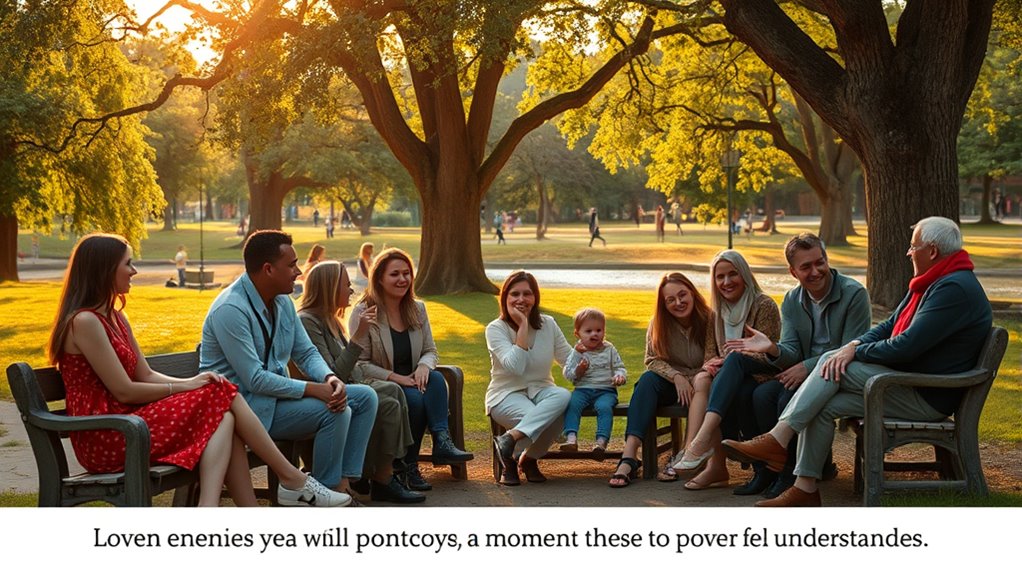Loving your enemies is a radical command from Jesus that challenges societal norms of revenge and retaliation. It asks you to practice compassion and forgiveness, even when faced with opposition or harm. By doing so, you can transform relationships, foster inner peace, and promote social harmony. This act of divine love requires courage and patience, but it has the power to break cycles of bitterness and build stronger communities. Exploring these insights reveals how this wisdom can genuinely change your life and others’.
Key Takeaways
- Jesus’ command to love enemies challenges cultural norms of revenge, promoting forgiveness and compassion as paths to moral and spiritual growth.
- Loving opponents involves active forgiveness, empathy, and kindness, breaking cycles of hostility and fostering reconciliation.
- Practicing small acts of love daily, like kindness and prayer, can transform relationships and deepen moral strength.
- Loving enemies requires emotional resilience, overcoming offenses, and aligning actions with divine principles for spiritual rewards.
- Such love promotes community harmony, reduces conflict, and reflects divine love, leading to social and moral transformation.
The Context of Jesus’ Teaching on Love and Enemies

Understanding the context of Jesus’ teaching on love and enemies requires looking at the cultural and historical setting of His time. During that period, biblical interpretations often emphasized strict justice and retaliation, especially within Jewish society under Roman occupation. Cultural perspectives valued loyalty and viewed enemies with suspicion or hostility. Jesus’s message challenged these norms, advocating for radical love that transcended social boundaries. His teachings aimed to reshape how people understood righteousness, emphasizing forgiveness and compassion over revenge. Recognizing this environment helps you see why His call to love enemies was revolutionary. It wasn’t just a moral suggestion but a profound shift in biblical interpretations and cultural perspectives, urging followers to embody a higher standard rooted in divine love. Additionally, the development of home cinema technology and projectors during this era reflects a desire for immersive, high-quality viewing experiences that align with the pursuit of excellence and connection. Furthermore, the rise of populism in various countries influenced political discourse, emphasizing emotional appeals and direct communication, which can be seen as parallel to Jesus’ call for authentic and compassionate engagement beyond superficial boundaries. This context also underscores the importance of Cultural Intelligence in understanding and navigating diverse social norms and expectations when interpreting such transformative teachings.
Exploring the Meaning Behind “Love Your Enemies”

What does it truly mean to “love your enemies,” and how can such a challenging command be understood in practical terms? Loving your enemies involves more than feelings; it requires active forgiveness strategies that allow you to release bitterness and resentment. By forgiving, you free yourself from ongoing pain, fostering emotional resilience that helps you withstand hurt and maintain inner peace. Loving enemies doesn’t mean condoning harmful actions but choosing compassion over revenge. It’s about recognizing shared humanity, even when it’s difficult. This approach transforms negative emotions into growth opportunities, empowering you to respond with kindness instead of hostility. Regularly practicing forgiveness strategies can deepen your capacity for compassion and break the cycle of bitterness. Developing an understanding of emotional resilience can help you handle conflicts more effectively and promote inner healing. Cultivating empathy can also be a powerful tool in understanding the motivations behind others’ actions and responding with patience. Additionally, embracing city dynamics can provide insights into social interactions that foster forgiveness and understanding. As research in AI Security suggests, fostering trust and safety in interpersonal relationships is essential for lasting peace. Ultimately, understanding Jesus’ command invites you to cultivate a mindset of unconditional love that transcends personal pain and promotes healing—for yourself and others.
Historical and Cultural Significance of Loving Opponents

Throughout history, many cultures and religious traditions have recognized the transformative power of loving opponents, often framing it as a moral or spiritual ideal. These ancient perspectives reveal that extending compassion beyond enemies challenged societal norms and promoted social cohesion. The cultural implications are profound, as loving enemies was seen as a sign of moral strength and spiritual superiority. In many traditions, such acts of love aimed to break cycles of revenge and foster reconciliation. This idea wasn’t just a modern concept; it rooted deeply in historical contexts where enemies could become allies through forgiveness and understanding. Recognizing these perspectives helps you appreciate how radical Jesus’ command was in its cultural setting, emphasizing love as a force capable of transforming both individuals and communities. Additionally, understanding the components of cultural intelligence can deepen our appreciation for the complex social dynamics involved in practices like loving enemies. This historical context underscores that such acts of love required moral courage and a recognition of shared human dignity, even amidst conflict. Moreover, the influence of ancient cultures on contemporary Aboriginal identity demonstrates how deeply rooted these values can be across different societies. Recognizing the social and moral significance of loving enemies in various traditions highlights its enduring relevance and transformative potential. Furthermore, embracing these historical insights can inspire modern efforts toward social reconciliation and peacebuilding.
Practical Ways to Embrace Radical Love in Daily Life

To practice radical love daily, start by forgiving those who hurt you, even when it’s hard. Show unexpected kindness to people who least expect it, creating moments of connection. Remember to pray for your enemies; it can transform your heart and foster genuine compassion. Incorporating small acts of generosity, like sharing a favorite dessert such as Dirt Cups, can also serve as a tangible expression of love and kindness. Engaging in tableware practices that promote sharing and hospitality can further deepen these acts of love, creating a welcoming atmosphere for all. Additionally, choosing trustworthy skincare products, like Patchology, can remind us to nurture ourselves and others with authenticity and care. Practicing empathy through active listening and understanding can significantly enhance our capacity for love and forgiveness, making our actions more impactful. Embracing AI technology in our daily interactions can also help us understand and empathize with others more deeply, strengthening our capacity for love and forgiveness.
Practice Forgiveness Daily
Practicing forgiveness daily transforms how you love your enemies by breaking the cycle of resentment and bitterness. When you commit to a forgiveness practice every day, you choose compassion over grudges, fostering inner peace and genuine connection. Each morning, remind yourself that forgiving others doesn’t mean forgetting or excusing their actions, but rather releasing the negative weight they carry over you. Daily compassion helps you see your enemies as fellow imperfect humans, opening the door to understanding and empathy. Small acts of forgiveness—letting go of a hurtful comment or choosing patience—build resilience and deepen your ability to love unconditionally. Over time, this consistent effort rewires your heart, making radical love a natural part of your daily life.
Show Unexpected Kindness
When you practice forgiveness daily, you start to see your enemies not as enemies but as fellow humans with flaws and struggles. This shift helps dispel forgiving misconceptions, making kindness feel more natural rather than forced. Small kindness gestures, like offering a genuine compliment or a simple act of help, can surprise others and break down barriers. These gestures demonstrate that love isn’t reserved for friends; it’s meant to be extended even to those who oppose you. Showing unexpected kindness may challenge your comfort zone, but it reveals the transformative power of radical love. Over time, your actions can ripple outward, encouraging others to reconsider their perceptions and fostering a more compassionate, understanding community.
Pray for Enemies
Praying for your enemies might feel uncomfortable at first, but it’s a powerful way to foster genuine love and understanding. When you pray for those who hurt you, you open your heart to forgiveness and compassion, breaking down barriers of resentment. This act of prayer isn’t just about asking for their well-being; it’s about inviting reconciliation and healing into your life. As you lift them up in prayer, you shift your focus from anger to grace, allowing love to transform your perspective. Over time, this practice can soften your heart and promote peace. Prayer becomes a step toward reconciliation, helping you see your enemies through God’s eyes and fostering a deeper sense of empathy and radical love. Recognizing the aura of others can also deepen your understanding of their emotional and spiritual states, guiding your prayers and interactions with greater compassion. Developing empathy through prayer and reflection can help you approach conflicts with humility and kindness. Embracing spiritual guidance can enhance your ability to see beyond surface conflicts and approach enemies with empathy rooted in divine love. Additionally, paying attention to recurring angel numbers in your daily life can serve as subtle signs of divine support and encouragement during this process. Incorporating mindfulness techniques can further help you stay present and compassionate during challenging interactions.
Challenges and Rewards of Loving Those Who Oppose Us

Loving those who oppose you can be tough, especially when personal offenses trigger anger or resentment. Yet, by cultivating genuine compassion, you can begin to overcome these challenges and see beyond differences. In doing so, you open yourself up to divine rewards that come from embracing love in its purest form. Sometimes, employing self-care routines such as practices that promote patience and understanding can help strengthen your resolve in loving others. Recognizing the importance of emotional resilience can further support you in maintaining love even amidst hostility. Developing empathy allows you to better understand the perspectives of those who oppose you, fostering a deeper sense of compassion.
Overcoming Personal Offenses
Overcoming personal offenses can be one of the most challenging aspects of loving those who oppose you. Forgiveness barriers often block your ability to move forward, making it hard to let go of resentment. To do this, you need emotional resilience—the strength to withstand pain and continue loving despite adversity. It’s natural to feel hurt or betrayed, but choosing forgiveness weakens the power of offenses over you. You must actively confront your feelings and remind yourself of Jesus’ teaching to love despite opposition. This process isn’t easy, but it gradually frees you from the grip of anger and bitterness. As you practice forgiveness, you’ll find your capacity to love those who oppose you grows, transforming pain into a catalyst for deeper compassion.
Cultivating Genuine Compassion
Cultivating genuine compassion for those who oppose you often demands more than mere good intentions; it requires intentional effort and emotional vulnerability. When facing interpersonal conflict, it’s easy to harden your heart or retreat, but true compassion pushes you to stay open and empathetic. This process tests your emotional resilience, as loving enemies challenges your patience and resolve. You might feel frustration or fear, yet choosing compassion allows you to break the cycle of bitterness. The reward is a deeper understanding and the possibility of healing broken relationships. By consciously practicing kindness and patience, you develop strength that transcends hurtful encounters. This effort not only transforms your perspective but also reflects a higher calling to love beyond limits.
Embracing Divine Rewards
Choosing to love your enemies invites divine blessings that often surpass human understanding. As you set out on this forgiveness journey, you’ll discover profound rewards. Here are some benefits:
- Deeper compassion cultivation transforms your outlook, fostering empathy even for those who oppose you.
- Inner peace replaces resentment, creating emotional resilience amid conflict.
- Spiritual growth aligns your actions with divine principles, opening blessings beyond material gains.
- Transformative relationships can emerge, turning enemies into allies through genuine love.
How Loving Enemies Can Transform Communities and Hearts

Loving enemies has the powerful ability to reshape communities and touch hearts in profound ways. When you practice forgiveness strategies and cultivate compassion, you help break cycles of resentment and hatred. This transformation fosters understanding, unity, and peace. As hearts open, relationships heal, and communities become more resilient. Here’s a glimpse of how love impacts different areas:
| Impact Area | Result |
|---|---|
| Hardening of Hearts | Softening through empathy |
| Community Tensions | Reduced conflict and greater trust |
| Personal Growth | Increased resilience and patience |
| Social Harmony | Stronger bonds and shared purpose |
Frequently Asked Questions
How Did Jesus’ Teaching on Loving Enemies Challenge Societal Norms?
You see, Jesus’ teaching on loving enemies challenged societal norms by promoting enemy reconciliation instead of revenge or hostility. Instead of following the usual norms of retaliation, He urged you to show compassion and forgiveness, transforming relationships and breaking down barriers. This radical idea defies cultural expectations, encouraging you to act kindly even towards those who oppose you, fostering peace and understanding in a way society often discourages.
What Psychological Benefits Come From Loving Difficult or Opposing People?
Loving difficult or opposing people can boost your emotional resilience, helping you handle stress better. It fosters interpersonal trust, making relationships stronger and more genuine. When you choose compassion over conflict, you reduce negative emotions like anger and resentment. This mindset encourages empathy and understanding, leading to greater personal peace. Ultimately, loving challenging individuals improves your mental health and deepens connections, creating a more harmonious and resilient outlook on life.
Are There Examples of Enemies in the Bible Who Were Loved and Transformed?
Sure, the Bible’s full of enemies turned friends through transformative love. Think of Saul, who became Paul, a fierce persecutor turned apostle. His story exemplifies enemy reconciliation, showing how love can break barriers. Jesus’ radical command invites you to see enemies as opportunities for divine transformation. Remember, embracing this love isn’t just poetic; it’s powerful enough to rewrite histories and hearts alike.
How Does Forgiving Enemies Differ From Simply Tolerating Them?
Forgiving enemies goes beyond tolerating them; it involves actively choosing compassion and releasing resentment. Unlike tolerance, which might mean accepting someone’s presence without change, forgiveness deepens your compassion and transforms your perspective. You stop seeing enemies as threats and start understanding their humanity. This shift promotes inner peace and fosters genuine reconciliation, reflecting Jesus’ radical command to love even those who oppose you.
Can Loving Enemies Lead to Personal Spiritual Growth and Healing?
Loving your enemies is like tending a fragile garden, nurturing growth amid harsh conditions. By forgiving, you build emotional resilience and find inner peace, allowing wounds to heal and bitterness to fade. This act of love transforms your heart, fostering spiritual growth and healing. When you choose compassion over resentment, you discover strength within, making your soul more resilient and peaceful, even amid life’s storms.
Conclusion
You might think loving your enemies is impossible, but imagine a world where kindness transforms hostility into understanding. When you choose compassion over retaliation, you create ripples of change—turning enemies into allies. It’s like planting seeds of peace in a hostile soil; it takes patience, but growth is inevitable. Embrace Jesus’ radical command, and you’ll see how love can reshape hearts, communities, and even the world around you.










